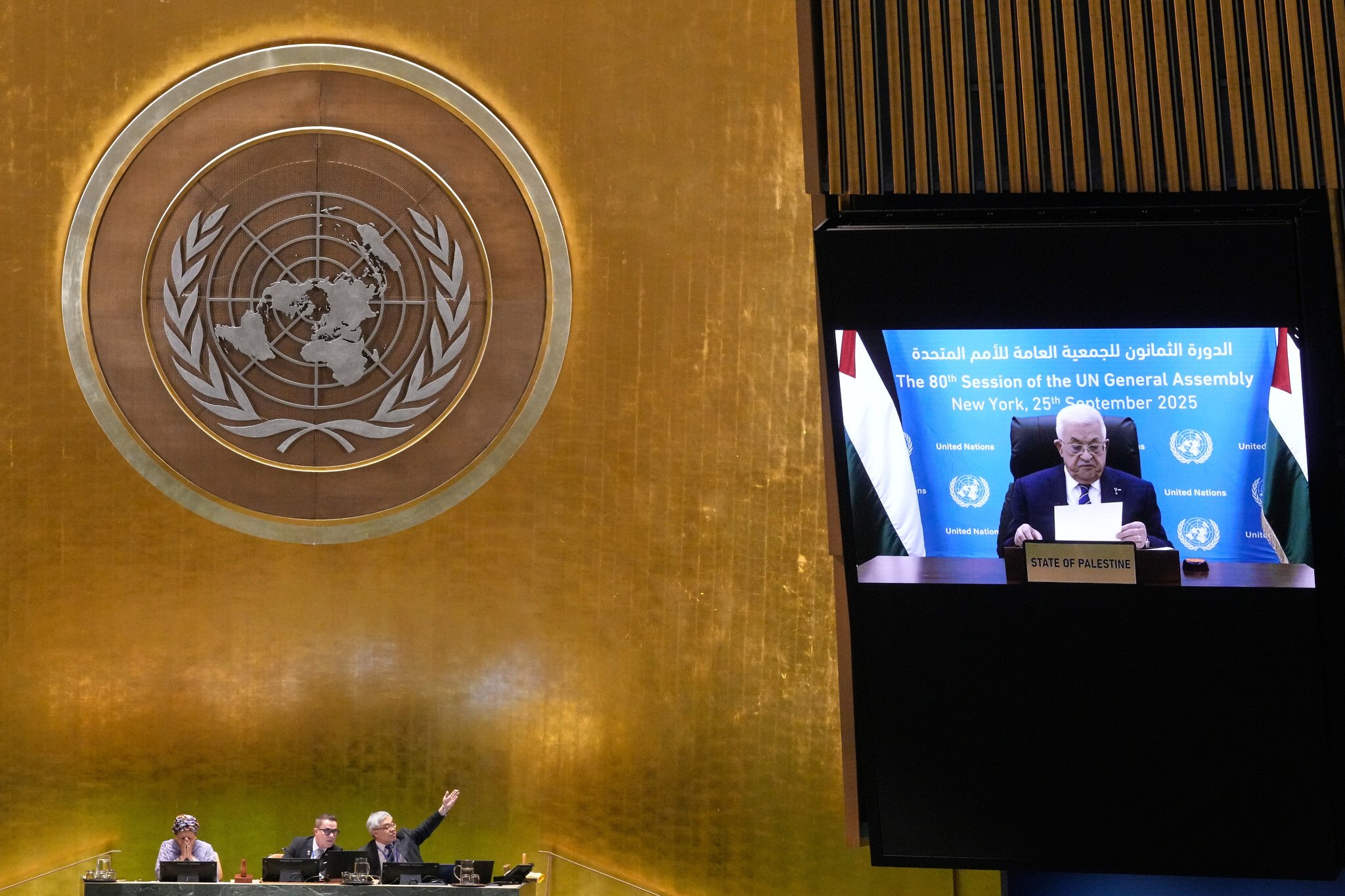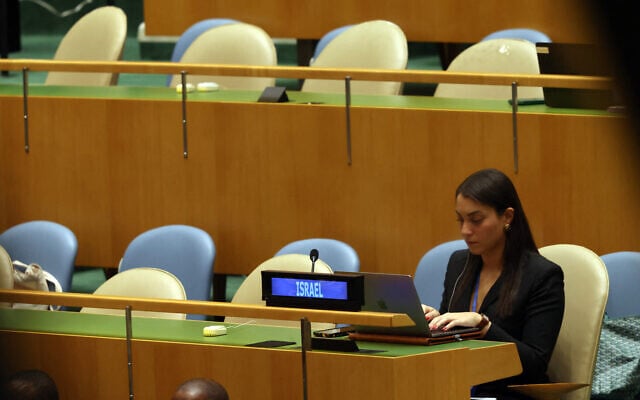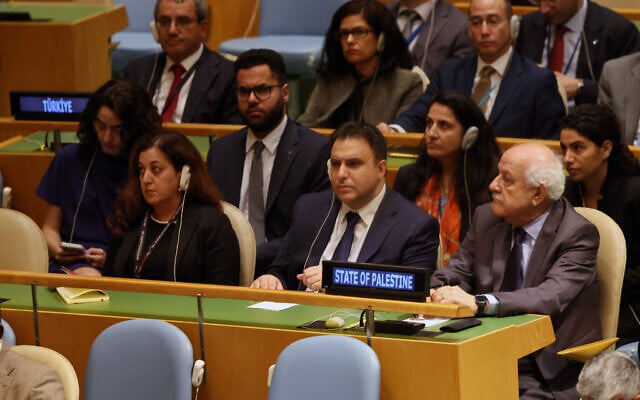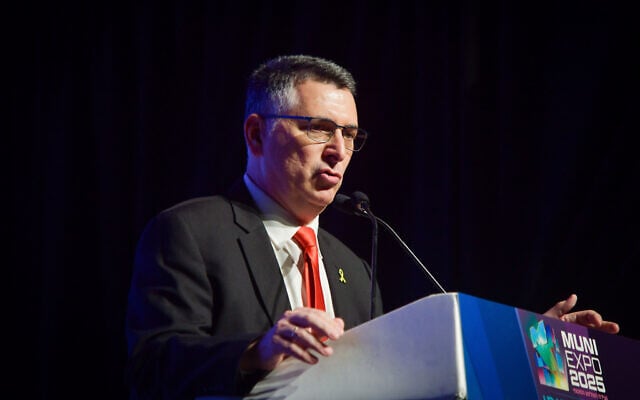


NEW YORK — Palestinian Authority President Mahmoud Abbas denounced both Israel’s “genocide” in Gaza as well as “what Hamas carried out on the seventh of October,” while declaring that Palestinians will defiantly remain on their lands, during his virtual speech at the UN General Assembly on Thursday.
In his address to the 80th session of the assembly, Abbas, 89, said the war has killed and wounded roughly 220,000 Palestinians, the majority of whom he said are women, children and the elderly, relying on figures from the Hamas-run health ministry, which doesn’t differentiate between civilians and combatants. Hamas says some 66,000 have been killed.
He highlighted Israeli settlement expansion in the West Bank, including the recent approval of the E1 settlement project, which aims to forestall efforts to establish a viable, contiguous Palestinian state, as well as unchecked settler violence.
“They burn homes and fields, they uproot trees and attack villages and attack unarmed Palestinian civilians. In fact, they kill them in broad daylight under the protection of the Israeli occupation army,” Abbas, who is one of the only world leaders authorized to speak virtually, said.
The US issued a visa ban on dozens of top PA officials in response to the decisions by Western countries to unilaterally recognize a Palestinian state.
“Despite all that our people have suffered, we reject what Hamas carried out on the seventh of October. These actions that targeted Israeli civilians and took them hostage… do not represent the Palestinian people, nor do they represent their just struggle for freedom and independence,” Abbas said, in a slightly more detailed condemnation than the ones he has issued in the past, including at a Monday two-state solution conference.
The first condemnation came in June, over a year and a half after Hamas-led terrorists murdered 1,200 people, mostly civilians, and took 251 hostages from southern communities, sparking the ongoing war.
Abbas insisted Thursday the PA is ready “to bear full responsibility for governance and security” in the Gaza Strip, where Hamas “will not have a role to play.”
The PA has been eager to replace Hamas in Gaza, but Israel has rejected the idea outright, while the US and the Arab world have maintained that Ramallah must undergo significant reforms until it can be better suited for the role and that a transitional body of independent Palestinian technocrats should govern the Strip in the interim.
Still, Abbas reiterated what much of the international community would like to hear — that “Hamas and other factions will have to hand over their weapons to the Palestinian Authority as part of a process to build the institutions of one state, one law and one legal security force.”
“We reiterate that we do not want an armed state,” Abbas said.
The PA president lamented that the UN has passed over 1,000 resolutions regarding the Palestinian plight that have gone unimplemented.
He said that while the PA has adhered to the Oslo Accords, Israel has not done the same.
“We made all our efforts to build the institutions of a modern Palestinian state that lives side by side in peace and security with Israel, but Israel did not adhere to the signed agreements and has worked systematically on undermining them,” Abbas stated.
Additionally, he thanked Western countries that recognized Palestine earlier this week at a conference co-hosted by France and Saudi Arabia, while urging the minority of roughly 45 holdout countries from the body of 193 states to get on board.
Abbas also expressed gratitude to those protesting on behalf of Palestinians around the world en masse.
“We reject confusing solidarity with the Palestinian cause [with] the issue of antisemitism — something we reject based on our values and principles,” Abbas said in one of the many messages that were a repeat from the speech he gave at the two-state solution conference on Monday.
Against the backdrop of that conference, Abbas took the opportunity on Thursday to reiterate nine points he said are needed:
- An immediate and permanent ceasefire in Gaza.
- The influx of humanitarian aid “to stop using starvation as a weapon”.
- The release of all hostages and prisoners on both sides.
- The complete withdrawal of Israeli forces from Gaza and an end to all Israeli unilateral actions that undermine a two-state solution, including settlement expansion, settler violence, Israeli land expropriation, and violations of the status quo at holy sites.
- The PA taking “full responsibility” over the transitional governing body of Palestinian technocrats that much of the international community envisions will administer Gaza after the war, so that it can smoothly be connected to the West Bank under a single governing authority.
While the transitional body should be under the umbrella of the UN, receive support from Arab allies and include an international peacekeeping force, disconnecting it completely from Ramallah risks replacing the PA completely, Abbas warned.
- A guarantee that residents of Gaza have the right to remain on their land, while a reconstruction plan is implemented.
- The release of Palestinian clearance revenues that Israel has been withholding for over four months, bringing the PA to the brink of collapse.
- Support for PA reforms, including the holding of elections within a year from the end of the war. “We want a modern and democratic state that abides by international law, the rule of law, multilateralism and the peaceful transition of power, and we are extremely keen to empower women and the youth,” Abbas said.
- The PA is ready to work with US President Donald Trump, Saudi Arabia, France and all partners to implement the peace plan authorized at this week’s two-state solution conference.
“Our people will remain rooted like the olive trees. Firm as the rocks, we will rise from under the rubble to rebuild,” Abbas said as he wrapped up his speech. “No matter how much our wounds bleed, and no matter how long this suffering lasts, it will not break our will to live and survive.”
“We want to live in freedom, security and peace, like all other people on earth, in an independent, sovereign state on the borders of 1967 with East Jerusalem as our capital in security and peace with our neighbors,” he continued.
“Peace cannot be achieved if justice is not achieved, and there can be no justice if Palestine is not freed,” Abbas said.
“The time has come for the international community to do right by the Palestinian people, so that they may obtain their legitimate rights to be rid of the occupation and to not remain hostage to the temperament of Israeli politics,” he added.
Foreign Minister Gideon Sa’ar derided Abbas’s speech, claiming that the Palestinian leader has failed to combat terrorism.
Sa’ar dismissed Abbas’s expressed intent in the speech for the PA to govern a postwar Gaza that offers no role to Hamas, writing in a post on X that Abbas “said that he is ready to receive the Gaza Strip, which he so easily lost to Hamas in 2007. How nice of him.”
Sa’ar accused Abbas of failing to “fight terrorism,” despite this being “the commitment on which the Palestinian Authority was founded.”
“To the West, he sells fine words. But his own people are meant to draw conclusions from the key he wears on his suit lapel,” Sa’ar added, calling the pin “the symbol for flooding Israel with the descendants of those Arabs who left in 1948 — and for its destruction.”
“Israel will not be deceived once again,” warned Sa’ar.
Sa’ar reiterated criticism from the Foreign Ministry earlier this week, which also pointed to Abbas’s pin when he addressed a UN conference by video on Monday.
Descendants of Palestinians who fled or were driven from their homes during Israel’s 1947-1949 War of Independence sometimes wear or display keys as a symbol of their yearning to return to those homes, with the so-called right of return once seen as a major sticking point in long-moribund efforts to reach an Israeli-Palestinian accommodation.
Israel argues that allowing Palestinians to return would result in an influx that would threaten its character as Jewish and democratic, demanding that the children and grandchildren of those who left no longer be recognized as refugees.
Nava Freiberg contributed to this report.




